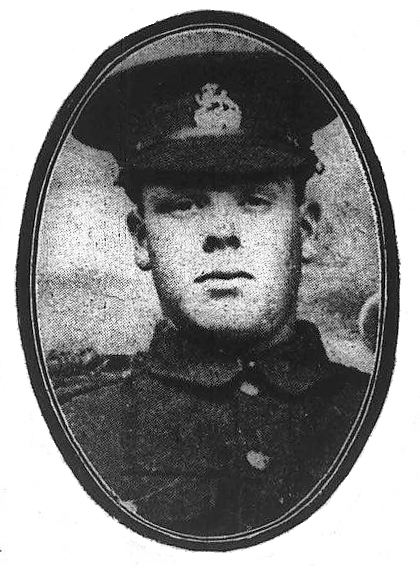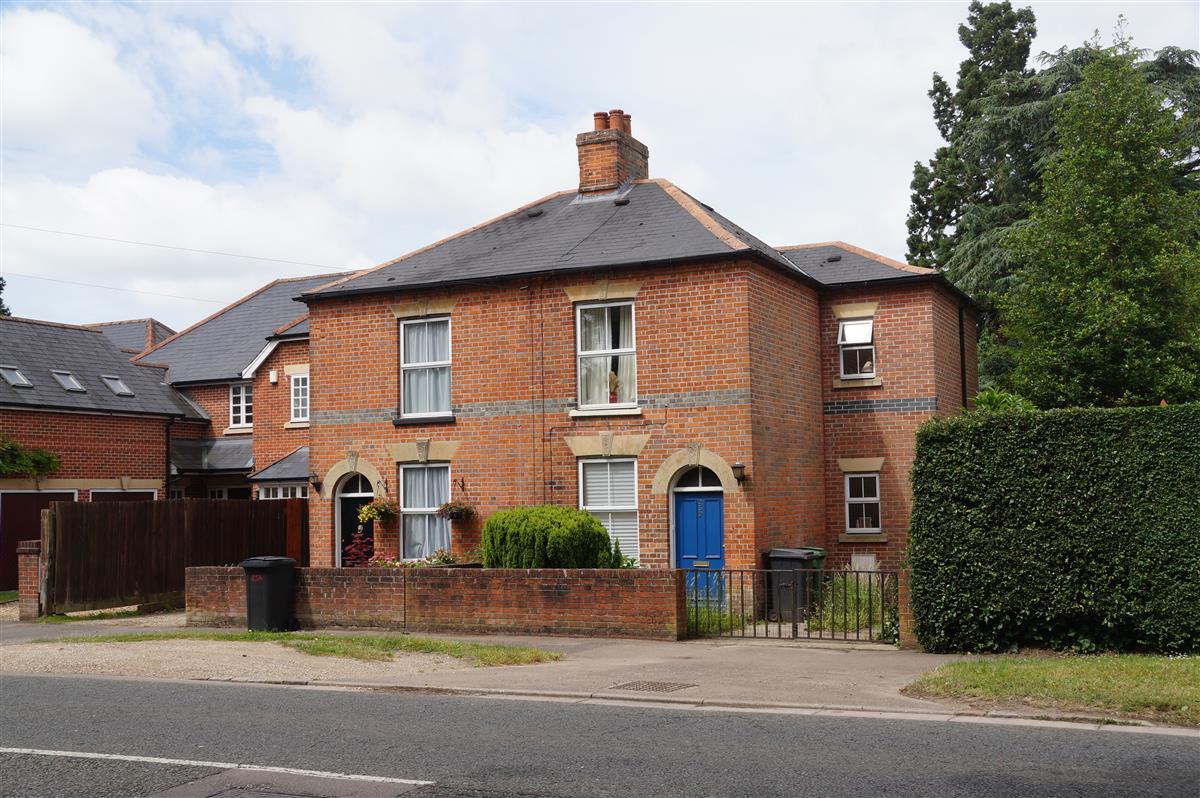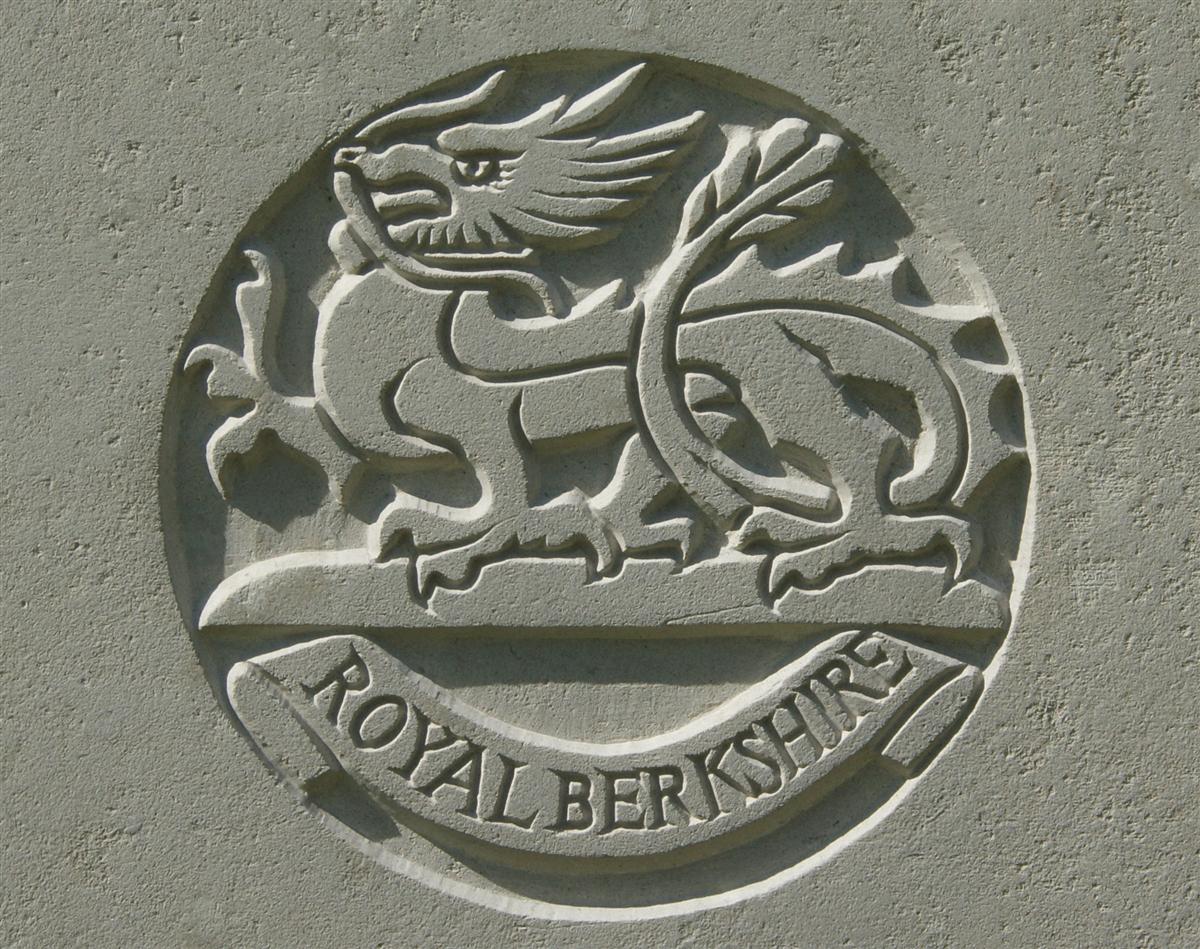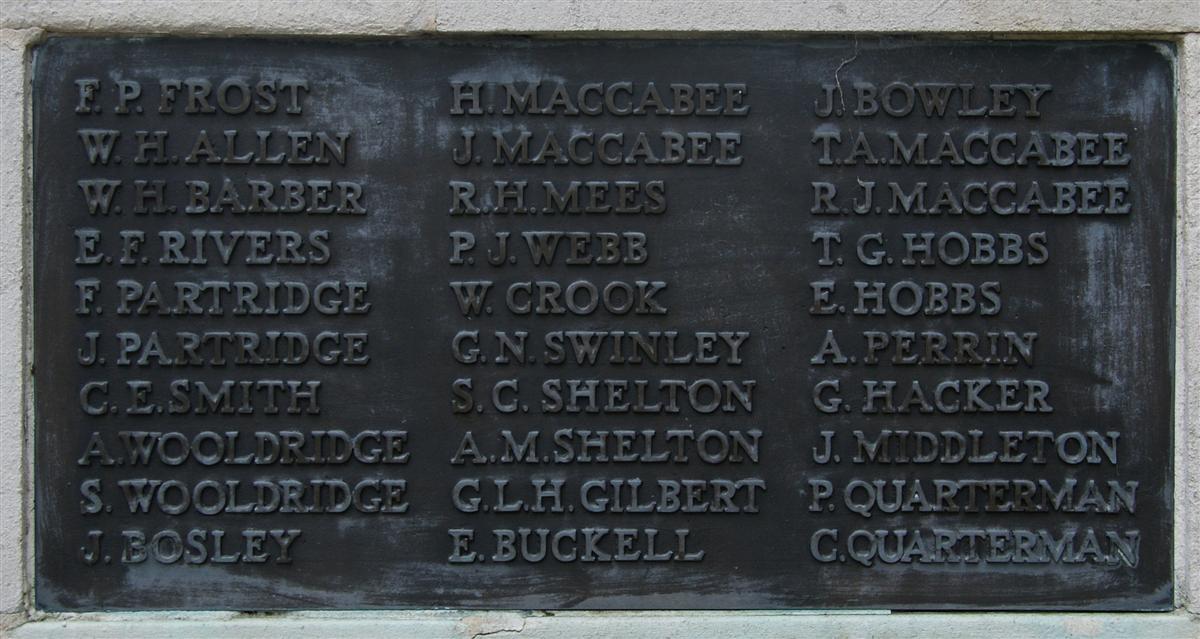Frank Partridge
Private 14496 Frank Partridge, A Company, 8th Battalion, Royal Berkshire Regiment

Frank Partridge (Berkshire Chronicle) |
Frank was reportedly born in Portsmouth in 1894/5 the son of Joseph Partridge and his wife Anne née Staniford. His birth does not appear in the national birth registration index, nor do those of his siblings, also born in Portsmouth: Anne (born c1887), Eliza (c1889) and Louisa (c1892). The family was living in Highland Road, Eastney at the south-eastern corner of Portsea Island; they were there because Joseph was a gunner in the Royal Marine Artillery, whose main UK base was in Eastney (now a museum). Joseph’s eldest child, Joseph, had been born in London in 1883 two years before he and Anne married; it is not known if Anne was his mother; neither Joseph or Anne was married before.
Between Frank’s birth in 1894 and 1896 the family moved to Enborne, a parish that adjoins Newbury to the west. The move was almost certainly the result of Joseph’s term of enlistment with the Royal Marines coming to an end. Enborne was, no doubt, chosen for the availability of work and housing and as a place familiar to Joseph, who was born and raised in Newtown, another parish adjacent Newbury but over the Hampshire/Berkshire border to the south. Here another son, William, was born in 1896.
The next move was to Wash Common in Newbury, which was a semi-rural part of Newbury alongside Enborne, their move could have been a very short one. They lived on Wash Common at Wenman’s Cottages. Two more children, John (1898) and Emily (1902) were born here.

252 Andover Road (nearest camera) and 254 - formerly Wenman's Cottages, the Partridge family home in Newbury. |
Following his schooling, which would have ended when he was fourteen, Frank found employment as on a local farm (there were several nearby) as a young labourer. It was a hard life, which may have made it easier when war came along, to make the decision to enlist. At the age of 18/19 there were other incentives; peer pressure and the opportunity for adventure in a war that everyone said would be over by Christmas. Frank signed up for service with the local Royal Berkshire Regiment on 8 September 1914 less than five weeks before war was declared.
He was posted to a new battalion, then assembling in Reading, the 8th (Service) Battalion. These new battalions created from the huge numbers of volunteers in the opening months of the war were officially designated as ‘Service’ battalions because the mens’ terms of service were different from those of Regular and Territorial troops in being for the ‘duration of the war’ rather than a fixed number of years. However, they were also given a poplar nickname – Kitchener battalions – from the Minister of War, Lord Kitchener, whose face was seen everywhere on the iconic ‘Your Country Needs You’ recruiting poster.
In the early days of the war there were shortages of everything needed to create a new battalion – apart from recruits. Gradually the new battalion turned from a gaggle of young men in civvies drilling with wooden ‘rifles’ into a fully equipped fighting unit. Training at Codford and Warminster on Salisbury Plain introduced them to the efficient use of real rifles, machine guns and, of course, to the digging of trenches.

The regimental badge of the Berkshire Regiment, as used on CWGC headstones. |
On 7 August 1915 the battalion embarked at Southampton bound for Le Havre. Instead of moving to France as part of a complete new division, like most of the Kitchener battalions, the 8th Royal Berks was allocated to the 1st Division, which had been in France since the British Expeditionary Force crossed the Channel in August 1914. A reorganisation of the Guards battalions into an elite Guards Division had left the 1st Division short of several battalions, the 8th Royal Berks and 10th Gloucesters were sent to France to bring the 1st Brigade up to strength. Naturally the men of the 8th Battalion took this as an honour – convinced that their performance in training had been exceptional - leading to the War Office’s decision to allocate them to this prestigious battle-hardened brigade and division.
However, it was not an honour that came with many benefits; when the Division was moved south from their positions around Ploegsteert in Belgium to enter the maelstrom of the Battle of Loos the brigade command decided to rest their battle-weary battalions and use the new battalions to launch the offensive. On 25 September the two Service battalions went ‘over the top’ in an attack on the village of Hulloch, north of Loos. The attack was a great success, but very costly in terms of casualties; the two new battalions advanced 1200 yards to the outskirts of Hulloch and held out against enemy counter-attacks before being reinforced and then relieved.
The Commander in Chief (Sir John French) wrote in his report on the battle:
The 1st Division attacking on the left of the 15th was unable at first to make any headway with its right brigade. The brigade on the left, the 1st [including the 8th Royal Berks] was however able to get forward and penetrated into the outskirts of the village of Hulluch, capturing some gun positions on the way. The determined advance of this brigade, with its right flank dangerously exposed, was most praiseworthy and continued with the action of divisional reserves was instrumental in causing the surrender of a German detachment some 500 strong which was holding up the advance of the right brigade in the front system of trenches. The inability of the right of the division to get forward had however caused sufficient delay to enable the enemy to collect local reserves behind the strong second line. The arrangements, the planning and the execution of the attack and the conduct of the troops of IV Corps were most efficient and praiseworthy.
The 8th Battalion’s casualties were estimated at 493 – around half of their strength. A number of the wounded would have suffered only minor wounds and may well have remained with the battalion; but losses like this were devastating, yet time after time battalions suffered like this and fought on.
Before long news of Frank’s death reached Newbury:
Newbury Weekly News, 18 November 1915 – Killed in Action
PARTRIDGE – Oct 13, 1915, killed in action in France, Pte Frank Partridge, 8th Batt Royal Berks Regt, second and dearly loved son of Joseph and Annie Partridge, of Wenman’s-cottages, Wash Common, aged 21.
Gone but not forgotten
Never will his memory fade,
Loving thoughts will ever linger
Around the spot where he is laid
His parents may have been misinformed about the date of Frank’s death as they give it as 13 October; though, perhaps, they mistook another date in the letter of notification they received as the date he died. It is also possible that the mistake was the War Office’s; the battalion was in action again on 13 October and again suffered heavily – the casualties from the two days may have been temporarily confused. It does not help to remove confusion that his entry in the medal roll for award of the 1914-15 Star gives his date of death as 25 September 1916! However, he is officially recorded by the War Office as dying on 25 September in the action described above. This was also the date given when the Berkshire Chronicle published his picture (above) on 26 November 1915 captioned: 8th Berks Man Killed : Private F Partridge, 8th Berks, Wenman’s Cottages, Wash Common, Newbury, killed in action September 25th.

Frank's name on Newbury War Memorial. (middle left) |
Locally he is remembered on tablet 2 of the Newbury Town War Memorial; immediately below Frank’s name is that of his elder brother, Joseph, who died in France in 1918 while serving with the 2/4th Battalion, Royal Berkshire Regiment – his story is told here.
From the early weeks of the war until conscription took effect in the spring of 1916 the local paper, the Newbury Weekly News, printed regular lists of men serving in the armed forces. The list, known as the Active Service Roll, was kept as up-to-date as possible by staff at the Borough’s Education Office. They relied in information supplied by family and friends supplemented by names appearing in newspaper articles. Frank’s service had gone unreported before his death – his name was announced as a new addition to the Roll appeared in the same edition as the notice of his death.

Find a memorial :
| Died this day: | |
| 02 March 1918 | |
| N G Burgess | |
| Newbury |

Like this site? Show your appreciation through a donation to a great charity.